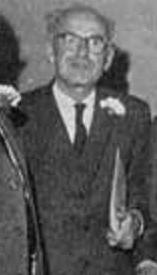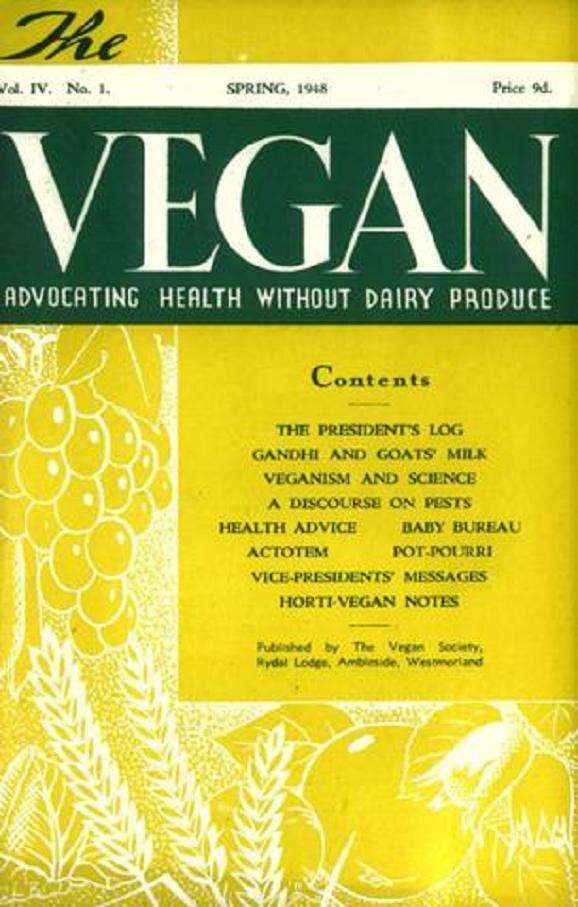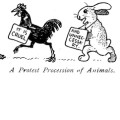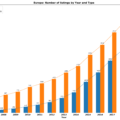~ There will be those, too, who will wish to supply veganism with an occult philosophical background. We will develop some sort of philosophy of life and, in any organised body of people adopting a diet based on moral or aesthetical precepts, there is always a tendency to cultivate a philosophy agreeing with and justifying their practice. While individuals may need such help, it would be unwise for the vegan movement to develop this aspect of its activity. This is not the right century for mass conversion by the appeal of philosophy or religious dogma. Keep veganism a practice based on ethics, aesthetics, humaneness, health, economics and science. We shall agree on this; and we shall disagree on anything else. ~ – MR. W. S. JAMES, M.Sc., Dept. of Education, Bristol University – writing in 1948. He was a member of the Scientific Sub-Committee of Vegetarian Nutritional Research Centre from its establishment in 1959, and Chairman of the Centre from 1964.
………………………………………………………………………………………………………
Reintroducing a vegan pioneer – W. S. James M.Sc., Dept. of Education, Bristol University.
He was very active in the 1940s – through to the early 1960s.
In the article W. S. James is talking about pure science – not ‘twisted science’ from scientists with hidden agendas, funded by unpleasant industries.
A deeply sensible individual who would have been deeply unimpressed with the activities of the many ‘guru syndrome afflicted’ 21stC ‘vegans’ – ………or perhaps ‘ve-gones’ is a better label for them?
………………………………………………………………………………………………………
Now – in full – one of our favorite old articles – from the Spring, 1948 issue of ‘The Vegan’ – by W. S. James.
We have carefully transcribed it – the original is below.
Originally in –
VEGANISM AND SCIENCE – AND A WARNING
By W. S. JAMES, M.Sc.
SCIENCE is based on facts; they are its raw material, and without observed or experimental facts scientific methods cannot function. It’s method is to collect facts, classify them, deduce hypotheses which can then be confirmed or rejected by testing them out experimentally. Where there are no agreed facts to work on, there can be no science. Science does not enter the moral or ethical field of human endeavour, and, while it may tell us what to do on practical grounds, it can never tell us anything about moral or ethical principles. In particular, science has nothing to say whether it is morally desirable to breed animals for slaughter, feed ourselves on the cacarcasses or exploit their sex functions for our dairy produce. Science, too is silent on aesthetic questions, for the same reason that there are no agreed facts to work with. The ugliness of the slaughter-house, the agony of the animal caught in the trap, the smell in the butcher’s shop, and the longings of the milking cow for the lost calf all escape the scientific net. Science does not deal with these things and does not pretend to. Science has never claimed to advise on what is beautiful or ugly, or what is right or wrong; it is just a technical instrument giving knowledge and control over our environment.
Both vegetarianism and veganism are, however, intimately connected with moral and aesthetic principles and seek to guide humanity in its spiritual development in the realms of value. They have contact with science in one aspect only, the question of whether the diet is adequate in all those calories, vitamins, proteins, amino-acids and mineral salts which science has found to be necessary. Science has confirmed the self-sufficiency of both the vegetarian and also the vegan diet, and there is also the fact that vegans do live successfully on their diet with undiminished physical energy. Veganism is not challenged at all by science and so there should be no friction. What the vegan discovers to be the Good and Beautiful is in harmony with what Science says is True.
While that might have been the end of this article, a warning is necessary if the vegan movement is to avoid the embarrassments and setbacks which the vegetarian movement has suffered. There are those in the vegetarian movement, and no doubt there will be those in the vegan movement, who oppose scientific thought and try to pick a quarrel with science, attempt to discredit it, and thereby ridicule their own movement in the process. For instance, there are magazines both in this country and abroad nominally supporting vegetarianism and progressive thought, but which actually at the same time drag in astrology and horoscopes! If such articles represented only so much waste paper, it would not be so bad, but, unfortunately, they do immeasurable damage to the cause, spreading the impression that vegetarianism is also a fatuous cult without any rational foundation. Veganism needs to avoid this sort of bunk and bathos, otherwise it will scare away the intellectually minded reformer forever. And there are other stagnant backwaters lying off the main stream of progress into which the vegan boat may easily get diverted by unscientific navigation. In the vegetarian world can be found curious dietetic theories, many of which are the results of the dictates of self-appointed experts in dietetics who have little respect for the facts. Veganism should beware of being captured by one of these cults, for that would mean the end of veganism as a vital, progressive force. Conflict with science, then, through the adoption of superstition or unscientific theories, must be avoided if veganism is to become the growing point of the vegetarian movement.
There will be those, too, who will wish to supply veganism with an occult philosophical background. We will develop some sort of philosophy of life and, in any organised body of people adopting a diet based on moral or aesthetical precepts, there is always a tendency to cultivate a philosophy agreeing with and justifying their practice. While individuals may need such help, it would be unwise for the vegan movement to develop this aspect of its activity. This is not the right century for mass conversion by the appeal of philosophy or religious dogma. Keep veganism a practice based on ethics, aesthetics, humaneness, health, economics and science. We shall agree on this; and we shall disagree on anything else.
Finally, there are those who attempt to invent new scientific theories for themselves and for the movement; a very laudable attitude, but rarely successful except by the most gifted. Some vegans are using the concept of “animal vibrations” to explain things. Now the Scientist is very clear as to what he means by a ‘”vibration.” He can detect it with physical apparatus, measure its frequency, velocity and amplitude. But “animal vibrations” are quite unknown to him: there may be such things, but they have not yet been discovered. So vegans might do well to avoid the term. Also, don’t let us be too sure yet that milk is the cause of cancer. We are doing right in collecting evidence for this view, but not in maintaining the fact.
The vegan’s best friend is the chemist. Round the corner of economic recovery, our friend is waiting to flood the market with synthetic plastics to replace leather, fur, skins, bristles, catgut, bone and ivory. Here is the way, and it would be a poor compliment to the Scientist if the vegan were to accept his goods gladly and at the same time adopt unscientific beliefs, naive dogmas or a superstitious outlook. Veganism has everything to gain by a wholehearted scientific attitude, and everything to lose by an unscientific approach. Do we want veganism to become another cult or aspect of vegetarianism, or do we want it to be the main driving force of the whole progressive movement? At the moment the control of veganism and the editorship of “The Vegan” are in safe hands. It will be necessary to see that they remain in safe hands if veganism is to be a significant factor influencing our national life.
W. S. James
………………………………………………………………………………………………………
Left to right: Dr A.G.Long, Mr W.S.James, Dr Frank Wokes, Dr E.F.Schumacher and Mr J.Lucas, all members of the Editorial Team of “Plant Foods for Human Nutrition”. Source.
If anyone has other articles by and / or information about W. S. James, please share them with us.
………………………………………………………………………………………………………
The original article – we do not have a better quality copy.
Read the full issue online – the article is on pages 6 & 7.
………………………………………………………………………
The Ernest Bell Library has a passion for sharing excellent quality vegan articles / items – making them easily available to 21st C folk.
Most early books & magazines on veganism were originally only published in the hundreds or in the low-thousands of copies.
Wars, weather, insects, careless humans, etc. have combined to make many of them very hard to find.
Our Projects
The Henry Salt Archive is one of our, almost completed, projects.
The Humanitarian League is our Hong Kong registered charity.
The Ernest Bell Library was conceived in 1934. It is still strong & active eighty years later – its primary objectives are to: –
-
Collect all of Ernest Bell’s book & non-book works and make them easily accessible to everyone.
-
Collect the literature of vegetarianism and all the other humanitarian movements in which Ernest Bell was so deeply involved.
-
Assist students and scholars in their research.
-
Introduce all aspects of Ernest Bell’s life, including his writings, campaign work, influences and his circle of friends.
-
Undertake our own research into missing aspects of Ernest Bell’s life and work.
We already have more than 300 pieces of Ernest Bell’s own writings.
We are also actively building a collection of examples of promotional material, campaign material, fundraising & marketing activities etc. – related to: –
-
veg(etari)an products.
-
veg(etari)an books & other publications.
-
veg(etari)an organisations.
-
veg(etari)an businesses.
-
animal rights organisations.
-
animal rights publications.
-
humanitarian organisations.
-
humanitarian publications.
-
rambling clubs run by members of the above groups & related publications.
-
the work of Richard St. Barbe Baker & the ‘Men of the Trees’ organization & its many sub-branches.














No Comments